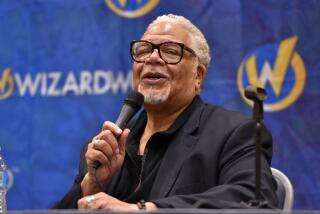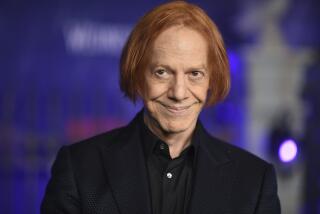POP MUSIC REVIEW : Oingo Boingo Develops Into a Beer-Drinker’s Talking Heads
- Share via
IRVINE — There was a time when the prospect of sitting through a 2 1/2-hour, 32-song Oingo Boingo concert would have been about as close to hell as many folks would care to come near Halloween. Even those who loved the L.A.-based group might have had difficulty digesting that much of its jerking rhythms and brash, too-clever lyrics.
But, unlike so many of its KROQ-oriented brethren, Boingo has grown as a band, to the point where it’s lengthy Irvine Meadows Amphitheatre show Friday night was a fine, solid, dance-happy entertainment with nary a dull spot.
In the last few years, Boingo leader Danny Elfman has progressed considerably as a songwriter, both in deepening his lyrical matter and broadening his music to encompass varied Third World rhythms. An eight-piece band driven by four horns and a kicking rhythm section, Boingo has developed into something of a beer-drinker’s Talking Heads.
There were not many Halloween costumes in the capacity audience, perhaps because the shows (Boingo also played Saturday) fell a few days short of the actual holiday. And the autumn night had to have been mighty chilly for those attired as Robert Palmer vixens.
But costumes or no, a party atmosphere prevailed throughout. There were few other places on a Friday night where one could see a mutant rabbit high-fiving the Pope (actually Irvine Meadows’ house caterer in regalia).
Aside from some members sporting inflatable skeletons on their backs for the opening “Dead Man’s Party,” Elfman and Co. left it to their music, inventive staging and big-screen video presentation to provide Halloween flavor. Flanked by two huge, festive Mexican Day of the Dead skeletons, the group was backed by a projection screen boiling with spinning skulls, cubist designs, light-show effects and cartoon designs.
Meanwhile, an overhead screen mixed a video-quality presentation of the live show with still more cartoons (including a field of pumpkins bearing the comic face of Boingo drummer Johnny (Vatos) Hernandez) and with old black-and-white horror flick footage. The latter was most effective when the live image of Elfman’s truly manic rictus was superimposed over the B-movie shots of screaming faces and hellish flames.
Along with the direct entertainment of it, Elfman’s antic persona may play a deeper role in Oingo Boingo’s tremendous popularity at Irvine, where they draw more than twice the audience they do anywhere else in the United States. Where a great many of his songs deal with a world over which people have no control or influence--subjects range from cynical powers manipulating youth to the thousands of military warheads aimed every which way--Elfman’s irrepressible enthusiasm, by example, seems to win out over his bleak songscapes.
It is possible that that message is very needed by youths living in the antiseptic, condo-locked vastness of the South County. Or maybe they just like to dance, a need more than addressed by the world-beat rhythms of Boingo’s musical sugar skulls.
The caffeinated “Who Do You Want to Be?” was further perked by rampaging bass and trombone solos. Elfman’s two strongest pop melodies--”We Close Our Eyes,” with bassist John Avila and guitarist Steve Bartek doubling on accordions, and “Not My Slave”--were record perfect. The encore “Grey Matter” became a roiling rhythm stew, with Elfman and Avila pounding on xylophones. Even the nervous pulse of early anthems like “Only a Lad” were kicked into a breakneck gear, with that song also gaining an a cappella section. Songs introduced from an upcoming album were received only slightly less well than the familiar material. Like several of his more macabre titles, the new, richly harmonied “Peel Away the Skin” contained a human message of the common bond between people.
The best of the new songs, “When the Lights Go Out,” was an ominous, disturbing number about a society turning desperate and ugly, though it was not so disturbing that the sellout audience did not dance through it--and every other second of the show up until the final Cab Calloway “hi-di-ho” of the last encore.
More to Read
The biggest entertainment stories
Get our big stories about Hollywood, film, television, music, arts, culture and more right in your inbox as soon as they publish.
You may occasionally receive promotional content from the Los Angeles Times.










